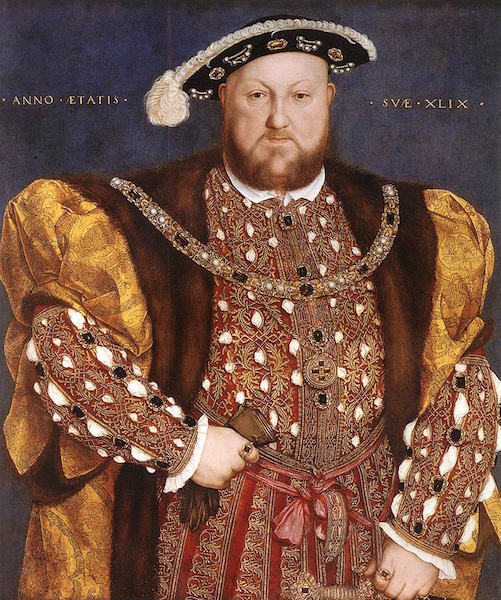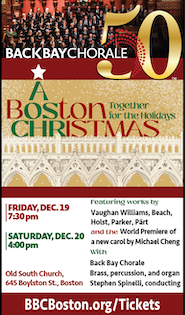Saint-Saëns’ rarely heard “Henry VIII” given full reign at Odyssey Opera

Henry VIII was the very model of a ruthless tyrant.
Yet in Camille Saint-Saëns’ Henry VIII, which Odyssey Opera performed at Jordan Hall Saturday night, the notorious English monarch is portrayed in a more complicated light. In conductor Gil Rose’s spacious rendition of this little-heard grand opera, Henry expressed all the duplicity of anyone bent on pursuing the limits of lust and power. The opera, in the end,feels like a cautionary tale for any era.
The libretto by Léonce Détroyat and Armand Silvestre tells of the crises that came to ensnare the Tudor dynasty. Henry is unhappily married to Catherine of Aragon, who cannot bear him a son. He longs to be with Anne Boleyn, whom he appoints as Catherine’s lady-in-waiting just to have her close by. Anne, however, is mired in a relationship with Spanish Ambassador Don Gomez, though she breaks it off when Henry makes his advances. When his divorce secures his separation from the Catholic Church, Henry marries Anne. But his new wife soon becomes terrified for her life and seeks to destroy all evidence, held by Catherine, that she ever loved Gomez. The jealous Henry, unable to secure the evidence from Catherine, issues a dire warning to Anne: “If I discover that I have been mocked, then the axe will fall.”
With a success that once rivaled Saint-Saëns’s Samson et Dalila, Henry VIII fell into neglect after World War I, when taste for large-scale romantic works dwindled. When heard in live performance, the opera retains its mesmerizing power, and Saint-Saëns’s music traverses all the twists of its true-to-life drama without ever falling flat.
Saturday’s performance was the world premiere of the opera’s original five-hour unedited version. Digging into the archives of the Paris Opera, musicologist Hugh Macdonald reconstructed scenes that were cut from the score prior to and following its 1883 premiere. Though perhaps not essential to the overall plot, the deleted scenes nonetheless contain arresting music. For instance, the septet at the close of Act 2, a section that the composer regretted omitting from the original production, contains some of Saint-Saëns’s most beautiful vocal and ensemble writing. Elsewhere, the score brims with colorful arias, duets, and orchestrations that cleverly weave Tudor-era tunes with lush romantic lines.
The singers for Saturday’s performance were consistently excellent.
Michael Chioldi sang with a rich, clarion baritone that fully captured all facets of Henry’s tenderness, arrogance, and jealousy. When he sang of Anne in his Act 3 aria, he took on the personal warmth of any potential suitor. But Chioldi’s hefty singing also reflected the bitterness that Henry felt towards Catherine. Only by opera’s end did his lines smooth out just enough to capture his concern when he learned that she is close to death.
Ellie Dehn’s lustrous soprano made the role of Catherine into a tragic figure. As her relationship with Henry grew more troubled, Dehn’s singing took on the sorrowful weight of a wife who was forever trying to please her husband. In the rest of the performance, Dehn was the very presence of a woman who remains devoted to her purpose and faith in light of unpleasant things. Even when Anne offered her a catty rebuke in an Act 2 duet, Dehn’s Catherine, with lines that unfolded into sparkling high notes, took the high road. The queen’s true place, she admitted to Anne, lies in eternity.
Hilary Ginther made Anne Boleyn into a calculating and complicated social-climber. The mezzo-soprano’s darkly projected voice conveyed Anne’s ambition to become queen, but her melting lyricism in her Act 3 duet with Chioldi suggested that the character actually loved Henry. Ginther’s radiant lower register also expressed horror, and when Anne had visions of her own death, her lines swelled with intensity.
With his full, ringing tenor, Yeghishe Manucharyan revealed all of Don Gomez’s emotional strife with assurance. In his Act 2 duet with Ginther, his phrases reflected both longing and scorn as he tried and failed to win back Anne’s love.
The role of Cardinal Campeggio is a small one, but bass-baritone Kevin Deas brought just the right touch of sorrow to make the character a sympathetic figure. His Act 3 aria proved the evening’s highlight as his character offered a final prayer for the defiant Henry.
The rest ofthe large cast was similarly captivating. David Kravitz brought his warm, oaken baritone to the role of the Duke of Norfolk. Matthew DiBattista’s tenor gleamed in the brief role as Le Comte de Surrey. And bass-baritone David Cushing, tenor Jeremy Ayres Fisher, and soprano Erin Merceruio Nelson each sang with conviction in their respective roles as the Archbishop of Canterbury, Garter King of Arms, and Lady Clarence.
With fine corporate blend and clear diction, the Odyssey Opera Chorus, prepared by Mariah Wilson, set vivid musical scenes set around London and at high court. The singers made for an especially loyal and passionate gathering when Henry declared himself head of church and state. The ensemble’s power and resonance also brought urgency to the opera’s climactic moments, where the singers’ phrases soared easily over Saint-Saëns’s thick orchestration.
Rose drew an orchestral accompaniment that conjured the emotions etched onto every page. Brooding cello lines underscored Henry’s jealousy, and bright violin tones reflected the serenity of Catherine’s religiosity. The overture took on the grace of a Tudor-era air, with the orchestra’s trumpets supplying regal pomp. In the introduction to Act 2, the orchestra’s silvery blend painted a quaint pastoral scene that looked ahead to Debussy.
The ballet featured additional highlights. The “Gypsy Dance” went with apt swagger, though string phrases briefly fell out of focus in the upward melodic sweeps. Woodwinds and violins faired better in the “Gigue,” bringing graceful touches to an opera rife with timely political and personal intrigue.
Gil Rose will lead Odyssey Opera in Giovanni Pacini’s Maria, Regina D’Inghilterra 7:30 p.m. November 1 at the Huntington Avenue Theatre. odysseyopera.org
Posted in Performances
